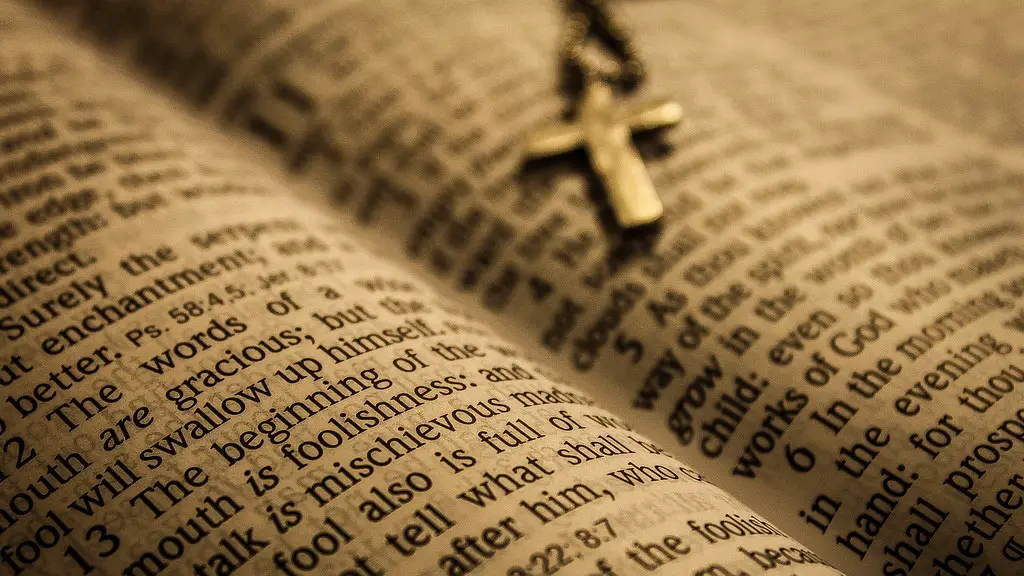The Concept Of Purgatory
Purgatory, commonly referred to as a spiritual “middle ground” – a place in between heaven and hell – has a long history within Christianity. It is a concept of transformation through fire that is widely propagated in various religions, including some interpretations of Judaism, Islam and Hinduism. From a Christian perspective, however, purgatory is only an intermediate state which is entered after death for those individuals who are neither heaven-bound nor hell-bound, as how “good” a person is judged is by their eternal standing in the eyes of God. According to tradition, purgatory is a realm of purification in which the souls of sinners undergo the expiatory suffering necessary to enter into the joy of heaven.
What Does The Bible Say About Purgatory?
Certain bible references to purgatory can be found in both the Old and New Testament. In the New Testament, the concept of a post-mortem purification of sins is suggested in Luke 16:19-31 where Jesus teaches of an afterlife with the division between heaven and hell. Further references to a “purifying fire” or purification of some kind can be found in the book of 1 Corinthians and Luke 12:49. The Old Testament also contains verses about this type of post-mortem purification, such as Ezekiel 18:20-32 and Proverbs 2:22.
By and large, the concept of purgatory is not stated explicitly in the Bible, yet it has been a part of the Christian faith for centuries. Catholic, Orthodox and a few Protestant denominations accept some teachings about purgatory or ‘purification,’ such as those mentioned in the Bible verses above. It is believed that the souls suffering in purgatory are those who have died in a state of grace but are not yet purified enough to enter into heaven.
The Role Of Prayers In Purgatory
Traditionally, prayers are offered on behalf of those souls in purgatory, in order to purify them and absolve them of their remaining sins before they enter heaven. It is believed by some denominations that the prayers of the living can hasten the process of purification and assist those souls to move on from the intermediate purgatory state. For instance, in the 14th century, the Catholic Church introduced the practice of praying for the dead, in order to reduce their time in purgatory.
The Roman Catholic Church has also developed their doctrine of indulgences based on the idea of prayers for the dead, in which the release of some of the temporal punishments for sin can be procured by offering indulgences on behalf of the soul. It is important to note, however, that the doctrine of indulgences is only applicable within Catholicism and is not accepted in other Christian sects such as Protestantism, who prefer to emphasize the importance of God’s grace in salvation, rather than man’s prayers.
The Question Of Suffering In Purgatory
The notion of purgatory as a place of suffering has been criticized by some Christian sects, who argue that God is all-merciful and will not punish a sinner more than they deserve. While some within the Catholic Church defend purgatory as a time of purification, it is generally accepted that suffering in purgatory is very different from suffering in hell. In purgatory, the pain of suffering is thought to be remedial, in other words, it is not inflicted as a punishment but is instead a purifying fire.
Proponents of the traditional interpretation of purgatory see the suffering associated with purgatory as a means by which the soul may receive cleansing from the remaining stains of sin, and be made ready for eternal union with God in heaven. This means that it is possible for a soul in purgatory to find peace and joy, even amidst their suffering, as they are moving ever closer to becoming one with God. It is also important to note that belief in purgatory has not been universal within Christianity and different Christian denominations have varied interpretations.
The Possibility Of Redemption In Purgatory
It is possible to believe that those souls in purgatory are not just suffering from the punishment due to their own sins, but that they may also be engaged in a process of intercessory prayer for others who are alive in this world. While the exact nature of this process remains mysterious, the idea of those in purgatory praying for the living serves as a powerful image of mercy and redemption.
This image is further reinforced by the New Testament account of Jesus’ descent into Hades, where he brought salvation to some prisoners. This suggests a crossover in which those in purgatory are also engaged in the redemptive action of intercessory prayer, not only for their own redemption but also for those alive on earth. As such, while the traditional view of purgatory includes a post-mortem punishment of some kind, it may also include a time of redemption and blessing.
The Power Of Faith In Purgatory
Ultimately, the concept of purgatory raises questions about the nature of divine justice, human nature and the afterlife. While some theologians and spiritual leaders may take a more rational approach to the mystery, others embrace the idea of purgatory as a source of spiritual comfort and renewal. Regardless of our individual beliefs about purgatory, it is clear that the power of faith and prayer can provide solace to the living, even in the darkest of times. It is from this perspective perhaps, that we can begin to appreciate the complexity and beauty of the afterlife according to Biblical teaching.
Other Beliefs Related To Purgatory
Although the Roman Catholic Church has traditionally taught of purgatory as a definitive place, other branches of Christianity view the concept in a more nuanced way, suggesting that the purification is something that can happen during life as well. In this interpretation, purgatory is more of an internal cleansing process and it is something which can be experienced here on Earth, as God works to bring healing and wholeness to those who seek it through prayer and meditation.
The Eastern Orthodox Church also holds a unique view of purgatory and believes both in the possibility of post-mortem purgatory as well as the idea of earthly purgatorium (meaning “purification”). Both Catholic and Orthodox Christians believe that purgatorial experiences can bring about spiritual transformation, although the exact nature and duration of this transformation remains open to interpretation.
The Role Of The Church In Purgatory
The Catholic Church is generally seen as the leading authority on purgatory, however, other branches of Christianity often emphasise the role of the Church in facilitating purification on Earth, rather than in a post-mortem realm. The Church is seen as the vessel that provides the sacramental means for purification, such as confession and reconciliation, as well as prayer and spiritual direction. Therefore, even if one does not believe in a post-mortem purgatory, the Church and its rituals can still provide spiritual guidance and support, allowing us to experience a “purification” of sorts as we strive for spiritual growth here on Earth.
The Importance Of Faith In Purgatory
Ultimately, the concept of purgatory and the various beliefs around it have developed over the centuries, and remain an object of speculation, even amongst those denominations which do accept some aspects of the teaching. Whether post-mortem purgatory exists or not, what is clear is the power of faith and prayer to bring us comfort and spiritual healing, even amidst suffering, confusion and doubt.
Indeed, irrespective of our individual beliefs, faith in a higher power can support us in times of difficulty and provide comfort and guidance to live a life of peace and reconciliation. As St. Augustine stated, faith is the assurance of things hoped for, the conviction of things not seen. Through its teachings on purgatory, the Bible encourages us to embrace hope and faith, no matter our circumstances. It is from this perspective, perhaps, that we can begin to truly appreciate the beauty of what purgatory stands for.



